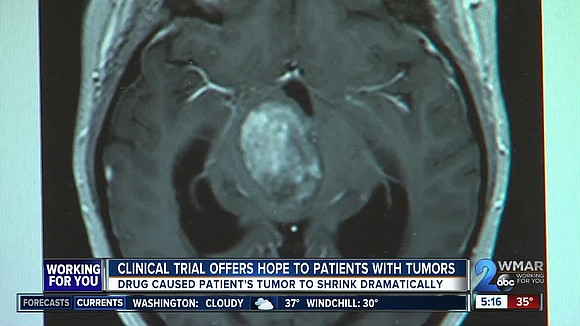Clinical trial at Johns Hopkins shows promise for kids diagnosed with certain type of tumor
CNN/Stylemagazine.com Newswire | 1/8/2019, 11:27 a.m.
By Megan Knight
Baltimore, Md. (WMAR) -- Seventeen-year-old Kaitlyn Dorman and her mom Mary take a trip down Memory Lane while going through a box of mementos from a tougher time in Kaitlyn's life.
"It all started when I would have tremors in my left hand when I would wake up," she said.
Dorman was diagnosed with a tumor on her brain, a low grade glioma, at the age of nine, not long after her family moved to Maryland from New Jersey. Doctors say low grade glioma are among the most common types of tumors found in children.
Doctors say while the chances of survival are high, the side effects of the tumors can be life-altering.
"I lost a lot of mobility and temporarily paralyzed on the left side of my body," she said. "I couldn't walk anymore and my left hand was pretty much useless."
For her mom, hearing that her daughter had a tumor was also life-altering but she knew she had to stay strong for Kaitlyn.
"I tried to make it more like this is just a mountain she has to climb," Mary Dorman said. "She's going to get through this, things will get better."
Doctors at Johns Hopkins started Dorman on a standard chemotherapy treatment but the tumor wasn't responding.
Her doctors suggested they enroll her in a clinical trial with a drug called Everolimus. Mary said she didn't hesitate much when given the option.
"We knew that if it didn't work we could always go back to trying something else," she said.
Within months of being put on Everolimus, Dorman noticed a drastic change in her body.
"Immediately after it started working, everything started gaining more feeling, everything started working again," she said. "It was incredible to start to feel normal again."
It was a shock to the doctors on her team too.
"That to us was sort of like having Christmas, our birthday and everything all wrapped up into one giant package," said Dr. Eric Raabe, a pediatric oncologist with the Johns Hopkins Kimmel Cancer Center, specializing in brain cancer.
Dr. Raabe was one of the doctors on Dorman's team during her enrollment in the clinical trial.
"To see that kind of response in a patient... and then to get the big reveal on the MRI was like 'wow, this is great,'" he said. "This is why we do this because we want to bring this kind of therapy to patients like Kaitlyn for whom standard therapy hadn't worked."
Dr. Raabe said Dorman's tumor went from about the size of a walnut to the size of a rice grain and is barely visible on an MRI image.
Dr. Raabe and researchers at Johns Hopkins are continuing to work on figuring out why Dorman responded so well to the drug and how they can replicate it in other patients. They recently published an article about some of their findings.
"Can we get smarter about this and can we use other therapies with Everolimus and make it so that more patients have this kind of response," he said.
This clinical trial is also being done at 10 to 15 other institutions around the country. Dr. Raabe expects it will take a couple more years until they can get this drug approved for this type of tumor. Everolimus is already approved for other types of tumors and cancers, said Dr. Raabe.
As for Dorman, she is doing very well years after being declared cancer-free. She is a senior in high school, loves music and volunteering and is happy to have cancer far behind her.
"It feels good not to have to focus on cancer anymore," she said with a big smile.




